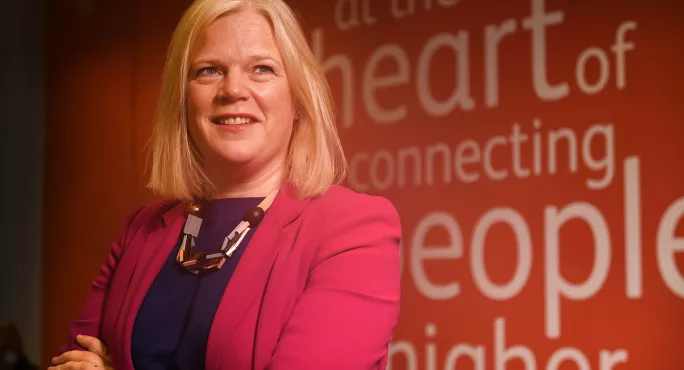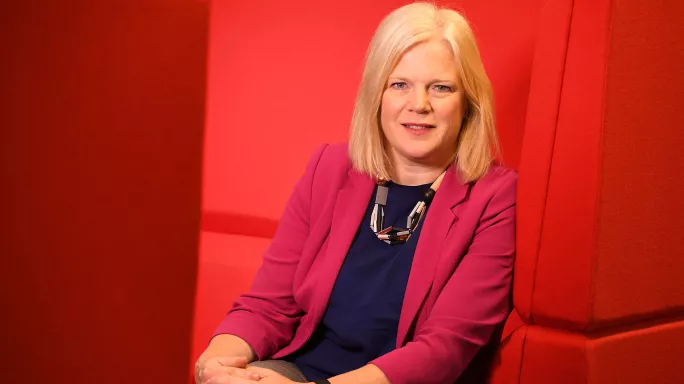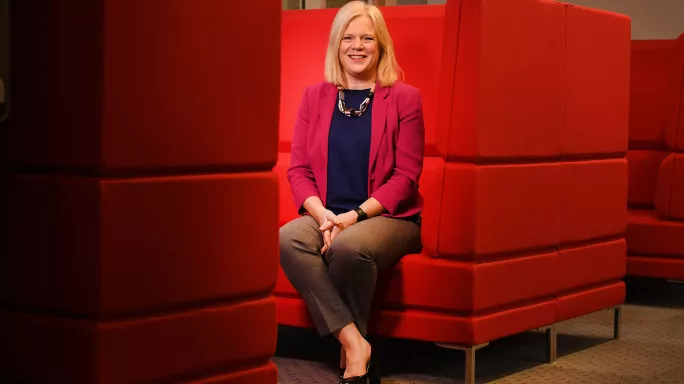- Home
- Tes profile: ‘Schools must build aspiration,’ says Ucas chief
Tes profile: ‘Schools must build aspiration,’ says Ucas chief

Clare Marchant is no stranger to pressure.
She used to be chief executive of Worcestershire County Council. In that role she had a £300 million budget and was responsible for high risk services like adult social care and children’s services, as well as that perennial voter bugbear, potholes. “You can’t get much more contentious than that,” she says.
But Marchant’s current role as chief executive of Ucas - which she has held since July 2017 - is hardly a walk in the park.
“It’s just different pressure,” she says. “It’s a national role. It’s much more high profile. If something goes wrong in Ucas, it’s a national story.”
What’s more, Marchant has decided to take the job at a time when universities are going through what she calls a “monumental period of change”. Dwindling funds, a government commissioned review of higher education and Brexit all loom large.
Tes spoke to Marchant about why she took the role, and how we can open up higher education to the least privileged at a time when universities are navigating such unchartered waters.
 Hardening up
Hardening up

While Marchant has only just moved to a full-time role in education, she’s done work in the public sector - first at a consultancy and then in the NHS and local government - since her late twenties. “I actually like to come to work to make a difference,” she says. “That sounds very corny but that’s very true.”
As is so often the case with people in education, there’s a family connection too. Both her parents worked in the sector - one as a teacher and the other as a careers adviser - so she thinks the “values with which I was brought up” meant she was primed to end up in education eventually.
As Marchant’s parents failed the 11-plus and went into higher education as mature students, it was a “big thing” for her family when she went to university at 18. So did the boss of Ucas have a smooth application process to university?
“It’s a long time ago now!”, she laughs. The process was very different then - a paper based application, no internet research. She chose the University of Hull because it had a “good politics school” and wasn’t too far from where she lived. Difficult circumstances in her family life meant affordability was an important factor too. “A key driver for me, because my parents were going through quite a nasty divorce, was somewhere where cost of living was cheap.”
Marchant says she enjoyed her time at Hull, though she admits there was a mid-course “blip” which made her realise she needed to “work a little bit harder”. She says university taught her self-discipline and independence. Much has been written recently about the rise of a “safe spaces” culture suffocating debate within our universities. Marchant had the opposite experience. “I had to respect other people’s arguments,” she remembers. “I was quite dogmatic before I went to university and it made me a little bit more appreciative of other people’s arguments.”
There was more toughening up in her first job after university. Marchant joined the food manufacturer Rank Hovis McDougall as a production management trainee. She was thrown into “12 hour nightshifts with 300 blokes in a food manufacturing plant”. “All men, night shifts, only woman,” Marchant recalls. “There was a bit of hardening up.” While making bread might seem a world away from handling university applications, her job was fundamentally about modernising processes using technology, and so not dissimilar to some of the challenges facing Ucas today. “It was about digitising what was quite a traditional way of food manufacturing. Bringing electronic engineering into it and stuff like that.”
Marchant’s career took her to consultancy and a job at the Department of Health, before she entered local government and climbed the ladder to be chief executive at Worcestershire. She served as CEO of the council for four years, and says she was happy there but moved on because local government lacked “an appetite for change”.
She should perhaps have been careful what she wished for.
 State of extraordinary flux
State of extraordinary flux

Marchant has entered higher education when it is in a state of extraordinary flux. A decline in the 18-year-old population and a decision by the government to uncap the number of students that universities can recruit has created intense competition between institutions. The losers in the scramble have seen their deficits balloon, and there are reports that some universities are on the edge of bankruptcy, although Marchant has sought to reassure pupils.
If that wasn’t enough, the government decided it was the right time to look at unpicking the higher education funding model - a report by former investment banker Philip Augar is due this spring. And for a famously international sector, there’s also the small matter of Brexit to contend with.
Under Marchant, Ucas has not been a passive observer in this changing landscape - it has helped shape the debate. The admissions body has drawn attention to the massive rise in unconditional offers, which have increased twenty-fold since 2013 and were received by more than a third of 18-year-olds in 2018. “There were parts of the sector that probably I wasn’t wholly popular with in terms of publishing their unconditional offers data,” Marchant says.
But while she admits to a “level of concern” about unconditional offers, Marchant warns against “black and white” thinking and is staunchly opposed to a blanket ban. “There are lots of circumstances where an unconditional offer - either alongside a portfolio, an audition, an interview, for some mental health reasons - is absolutely appropriate.”
She is most worried about a “smaller group of universities” who are offering unconditional offers “at scale without thought for the circumstances of the individual student”. However, she shies away from naming the offenders and insists it’s not the job of Ucas to propose solutions because “we’re not a regulator”. “We’re a provider of admissions, a provider of information and advice, a provider of transparent data,” she says.
Marchant does, however, acknowledge that many teachers have concerns about unconditional offers. “The teachers we engage through our secondary education advisory groups...are all of the mind that this is not helping students,” she says. “I think out of every 10 teachers I’ve met, nine of them have said that.”
The buyer’s market in higher education has also resulted in more pupils going to university with lower grades. According to data from Ucas, more than 80 per cent of applicants holding the equivalent of three Ds were accepted to university in 2018. When asked whether this is a positive development, Marchant replies: “I don’t think it’s a bad thing.” She’s certainly against the idea - reportedly under consideration by the Augar review - to withdraw student loans for those achieving less than three Ds.
However, Marchant does admit that the trend raises “serious questions for us as a society about what are the meaningful alternatives to undergraduate degrees”. She says applying to university is often just “the simplest route” because of the complexity surrounding alternatives like apprenticeships.
The 2017 Conservative manifesto promised a “Ucas-style portal” for apprenticeships and the House of Commons Education Select Committee has thrown its weight behind the idea. Marchant is keen to run it, but says the government must formally back the policy and stump up the cash to deliver it.
One of the reasons Marchant opposes withdrawing loans from pupils with low grades is because of the consequences for social mobility. She’s concerned that progress has already slowed in closing the gap between advantaged and disadvantaged pupils going to university. Universities are spending a “huge amount of money” on outreach, she says, but they need to do a better job of evaluating that work to make sure they’re dedicating their resources effectively.
Her instinct is that what works will be “different in different places” and there shouldn’t be a “one size fits all” approach. She believes schools have a key role to play in building aspiration, and that this should begin in “primary and even early years”.
When it comes to judging what measures will encourage more pupils from poorer backgrounds to go to university, she reaches back to her own experience. She’s sceptical that a cut in tuition fees will make the difference, but thinks clamping down on the cost of living might. “I absolutely had to take the cost of living into account if I was going to go to university”, she says, “and there will be many students who are doing that now”.
The perfect storm of change engulfing higher education is completed by Brexit. At the start of January, university heads warned that a no-deal Brexit is “one the biggest threats” institutions have ever faced. Marchant is standing with them. “If you’re asking me do I worry about a no-deal Brexit or a Brexit that has a detrimental effect on higher education, absolutely,” she says.
With universities poised on the threshold of momentous change, Marchant thinks some reforms can wait. She’s not opposed to post-qualification admissions to university in principle, but warns that it could “really backfire” if not accompanied by wider changes to the education system. She’s doubtful that higher education has the headspace to accomplish it at the moment. Asked whether technology-enabled continuous assessment will replace terminal exams, Marchant’s experience introducing technology to the NHS inclines her to think it’s still some way off. “I implemented some technology in 2003, and it was only six months ago it rolled out to every single GP practice in the country.”
Higher education is a complex place, but sometimes it boils down to simple observations. Marchant’s experience as a teenager worrying about the cost of living informs her thinking about access. Her experience today as a parent leaves her under no illusion about the scale of the task which the whole higher education system is grappling with. “My son is in Year 6 at the moment,” she says. “I swear that out of his classmates, they’ve sort of made their mind up about whether they’re going to go to university or not. And that’s at age 10.”
CV: Clare Marchant
St Patrick’s Catholic Primary School, Wellington Shropshire
Christleton High School, Chester, Cheshire
University of Hull: History and Politics
Open University: MS, Manufacturing, management and technology
1993: Engineering and production manager, Rank Hovis McDougall
1997: Manager, Deloitte Consulting
2003: Chief deployment officer, Department of Health
2010: Head of change, Worcestershire County Council
2012: Deputy chief executive, Worcestershire County Council
2014: Chief executive, Worcestershire County Council
2017: Chief executive, Ucas
Register with Tes and you can read two free articles every month plus you'll have access to our range of award-winning newsletters.
Keep reading with our special offer!
You’ve reached your limit of free articles this month.
- Unlimited access to all Tes magazine content
- Save your favourite articles and gift them to your colleagues
- Exclusive subscriber-only stories
- Over 200,000 archived articles
- Unlimited access to all Tes magazine content
- Save your favourite articles and gift them to your colleagues
- Exclusive subscriber-only stories
- Over 200,000 archived articles



